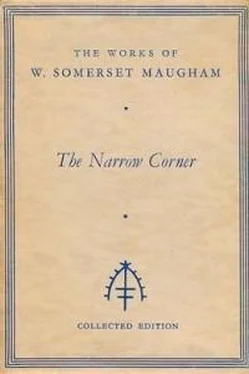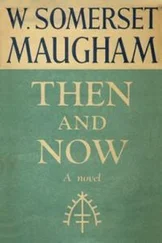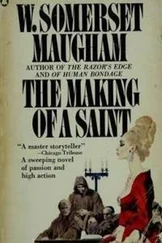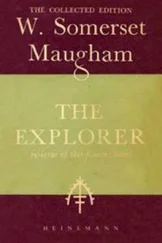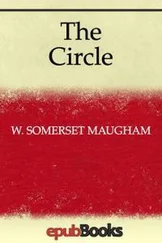“Don’t look so bad,” he said, as the little town was discovered.
There were warehouses to the water’s edge and native houses on poles with thatched roofs. Naked children were playing about in the clear water. A Chinese in a broad–brimmed hat was fishing from a dug–out. The harbour was far from crowded: there were only two junks, three or four large prahus, a motor–boat and a derelict schooner. Beyond the town was a hill surmounted by a flagstaff, and from it dangled limply a Dutch flag.
“I wonder if there’s a hotel,” murmured the doctor.
He and Fred Blake stood on each side of Captain Nichols at the helm.
“Sure to be. Used to be a grand place in the old days. Centre of the spice trade and all that. Nutmegs. Never been ’ere meself, but I been told there’s marble palaces and I don’t know what all.”
There were two piers. One was neat and tidy; the other, of wood, was ramshackle and badly needed a coat of paint. It was shorter than the first.
“The long ’un belongs to the Netherlands Company, I guess,” said the skipper. “Let’s go to the other.”
They reached the side. The mainsail was lowered with a clatter and they tied up.
“Well, doc, you’ve arrived. Luggage ready and all that?”
“You’re coming ashore, aren’t you?”
“What about it, Fred?”
“Yes, come on. I’m sick of being aboard this boat. And we’ve got to get another dinghy, anyway.”
“We’ll be wantin’ a new jib, too. I’ll just go and doll meself up and then I’ll join you.”
The skipper went down into the cabin. His toilet did not take him long, for it consisted only in changing his pyjamas for a pair of khaki trousers, putting a khaki coat on his bare back and slipping his naked feet into old tennis shoes. They clambered by rickety steps on to the pier and walked along it. There was no one there. They reached the quay and after hesitating for a moment took what looked like the main street. It was empty and silent. They wandered down the middle of the roadway, abreast, and looked about them. It was pleasant to be able to stretch one’s legs after those days on the lugger, and a relief to feel under one’s feet the solid earth. The bungalows on either side of the road had very high roofs, thatched and pointed, and the roofs, jutting out, were supported by pillars, Doric and Corinthian, so as to form broad verandahs. They had an air of ancient opulence, but their whitewash was stained and worn, and the little gardens in front of them were rank with tangled weeds. They came to shops and they all seemed to sell the same sort of things, cottons, sarongs and canned foods. There was no animation. Some of the shops had not even an attendant, as though no purchaser could possibly be expected. The few persons they passed, Malays or Chinese, walked quickly as though they were afraid to awaken the echo. Now and then a whiff of nutmeg assaulted the nostrils. Dr. Saunders stopped a Chinese and asked him where the hotel was. He told them to go straight on, and presently they came to it. They went in. There was no one about, but they sat down at a table on the verandah and thumped on it with their fists. A native woman in a sarong came and looked at them, but vanished when the doctor addressed her. Then appeared a half–caste, buttoning up his stengah–shifter, and Dr. Saunders asked if he could have a room. The man did not understand, and the doctor spoke to him in Chinese. The man answered in Dutch, but when the doctor shook his head, with a smile made signs that they were to wait and ran down the steps. They saw him cross the road.
“Gone to fetch someone, I expect,” said the skipper. “Extraordinary thing they shouldn’t speak English. They give me to understand the place was civilized.”
The half–caste returned in a few minutes with a white man, who gave them a curious glance as his companion pointed them out to him, and then as he came up the steps politely raised his topi.
“Good morning, gentlemen,” he said. “Can I be of any service to you? Van Ryk cannot understand what you want.”
He spoke English very correctly, but with a foreign accent. He was a young man, in the twenties, very tall, six foot three at least, and broad–shouldered, a powerful fellow, but clumsily built, so that though he gave you an impression of great strength, it was of an ungainly nature. His ducks were neat and clean. A fountain pen protruded from the pocket of his closely–buttoned tunic.
“We’ve just come in on a sailing–boat,” said the doctor, “and I want to know if I can have a room here till the next steamer comes in.”
“Surely. The hotel isn’t as full as all that.”
He turned to the half–caste and fluently explained what the doctor wanted. After a brief conversation he returned to English.
“Yes, he can give you a nice room. Your board included, it’ll come to eight gulden a day. The manager’s away at Batavia, but van Ryk’s looking after things, and he’ll make you comfortable.”
“What about a drink?” said the skipper. “Let’s ’ave some beer.”
“Won’t you join us?” asked the doctor politely.
“Thank you very much.”
The young man sat down and took off his topi. He had a broad, flat face and a flat nose, with high cheek–bones and rather small black eyes; his smooth skin was sallow, and there was no colour in his cheeks; his hair, cut very short, was coal–black. He was not at all good–looking, but his great ugly face bore an expression of such good nature that you could not but be somewhat taken by him. His eyes were mild and kindly.
“Dutch?” asked the skipper.
“No, I’m a Dane. Erik Christessen. I represent a Danish company here.”
“Been here long?”
“Four years.”
“Good God!” cried Fred Blake.
Erik Christessen gave a little laugh, childlike in its simplicity, and his friendly eyes beamed with good will.
“It’s a fine place. It’s the most romantic spot in the East. They wanted to move me, but I begged them to let me stay on.”
A boy brought them bottled beer, and the huge Dane before drinking raised his glass.
“Your very good health, gentlemen.”
Dr. Saunders did not know why the stranger so very much attracted him. It was not only his cordiality, that was common enough in the East: there was something in his personality that pleased.
“Don’t look as if there was much business ’ere,” said Captain Nichols.
“The place is dead. We live on our memories. That is what gives the island its character. In the old days, you know, there was so much traffic that sometimes the harbour was full and vessels had to wait outside till the departure of a fleet gave them a chance to enter. I hope you’ll stay here long enough to let me show you round. It’s lovely. An unsuspected isle in far–off seas.”
The doctor pricked up his ears. He recognized it as a quotation, but could not place it.
“What does that come from?”
“That? Oh, ‘Pippa Passes.’ Browning, you know.”
“How does it happen that you’ve read that?”
“I read a lot. I have plenty of time, you see. I like English poetry best of all. Ah, Shakespeare.” He looked at Fred with a soft, gracious glance, a smile on his great mouth, and began to recite:
“‘…of one whose hand, Like the base Indian, threw a pearl away Richer than all his tribe; of one whose subdued eyes, Albeit unused to the melting mood, Drop tears as fast as the Arabian trees Their medicinal gum.’”
It sounded odd in that foreign accent, somewhat gruff and guttural, but what was odder still was that there a young Danish trader should quote Shakespeare to the shifty scoundrel Captain Nichols and to the oafish lad Fred Blake. Dr. Saunders found the situation faintly humorous. The skipper gave him a wink that signified quite clearly that this was a queer fish, but Fred Blake flushed and looked shy. The Dane had no notion that he had done anything to excite surprise. He went on eagerly:
Читать дальше
Конец ознакомительного отрывка
Купить книгу
